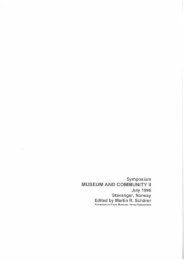Key Concepts of Museology - ICOM
Key Concepts of Museology - ICOM
Key Concepts of Museology - ICOM
You also want an ePaper? Increase the reach of your titles
YUMPU automatically turns print PDFs into web optimized ePapers that Google loves.
3. For some years the notion <strong>of</strong> heritage,<br />
essentially defi ned on the basis<br />
<strong>of</strong> a western concept <strong>of</strong> transmission,<br />
has felt the impact <strong>of</strong> the globalisation<br />
<strong>of</strong> ideas, such as the relatively recent<br />
concept <strong>of</strong> intangible heritage. This<br />
concept, <strong>of</strong> Asian origin (in particular<br />
from Japan and Korea) is founded<br />
on the idea that transmission, to be<br />
effective, must essentially be done by<br />
human carriers, from whence evolved<br />
the idea <strong>of</strong> living human treasures:<br />
“Living human treasure refers<br />
to a person who excels above others<br />
in performing music, dance, games,<br />
plays and rituals which are <strong>of</strong> outstanding<br />
artistic and historical value<br />
in their respective countries as envisaged<br />
in the Recommendation on the<br />
Safeguarding <strong>of</strong> Traditional Cultures<br />
and Folklore” (UNESCO, 1993).<br />
This principle was accepted internationally<br />
and endorsed in the 2003<br />
Convention for the Safeguarding <strong>of</strong><br />
the Intangible Cultural Heritage.<br />
“The intangible cultural heritage<br />
means the practices, representations,<br />
expressions, knowledge, skills – as<br />
well as the instruments, objects,<br />
artefacts and cultural spaces associated<br />
therewith – that communities,<br />
groups and, in some cases, individuals<br />
recognize as part <strong>of</strong> their cultural<br />
heritage. This intangible cultural<br />
heritage, transmitted from generation<br />
to generation, is constantly recreated<br />
by communities and groups in response<br />
to their environment, their<br />
interaction with nature and their history,<br />
and provides them with a sense<br />
<strong>of</strong> identity and continuity, thus pro-<br />
moting respect for cultural diversity<br />
and human creativity. For the purposes<br />
<strong>of</strong> this Convention, consideration<br />
will be given solely to such intangible<br />
cultural heritage as is compatible<br />
with existing international human<br />
rights instruments, as well as with<br />
the requirements <strong>of</strong> mutual respect<br />
among communities, groups and<br />
individuals, and <strong>of</strong> sustainable development.”<br />
(UNESCO, 2003).<br />
4. Heritage covers a fi eld that has<br />
become increasingly complex, and in<br />
the past few years the uncertainties<br />
<strong>of</strong> its transmission have led to more<br />
focused thinking on the mechanisms<br />
<strong>of</strong> building and extending heritage:<br />
what exactly is the process <strong>of</strong> heritage<br />
building? Much contemporary<br />
research analyses the institution <strong>of</strong><br />
heritage building beyond the empirical<br />
approach, seeing it as the result <strong>of</strong><br />
strategies and interventions focused<br />
on marking and signals (framing).<br />
Thus the idea <strong>of</strong> heritage building is<br />
necessary to understand the position<br />
in society that heritage represents,<br />
rather as others speak <strong>of</strong> the idea <strong>of</strong><br />
“artifi cation” (Shapiro, 2004) with<br />
regard to works <strong>of</strong> art. “Heritage is a<br />
cultural process or performance that<br />
is concerned with the types <strong>of</strong> production<br />
and the negotiation <strong>of</strong> cultural<br />
identity, individual and collective<br />
memory, and social and cultural<br />
values” (Smith, 2007). If we accept<br />
that heritage is the result <strong>of</strong> the founding<br />
<strong>of</strong> a certain number <strong>of</strong> values,<br />
this implies that these values are the<br />
basis <strong>of</strong> heritage. These values should<br />
be examined, but also – sometimes –<br />
contested.<br />
41
















